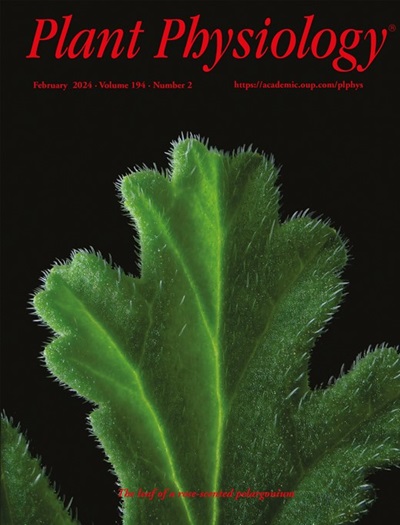OsS40-14 regulates rice seed germination by modulating ABA responsiveness and inhibiting dormancy release.
IF 6.9
1区 生物学
Q1 PLANT SCIENCES
引用次数: 0
Abstract
Seed germination is a complex process influenced by various physical and biochemical factors, and dormancy release upon imbibition is essential for germination. However, the specific regulators controlling dormancy release in rice remain largely unknown. Here, we identified OsS40-14, a member of the senescence-associated S40 gene family, as a negative regulator of seed germination in rice. Using CRISPR/Cas9 gene editing and transgenic overexpression (OE) lines, we found that the oss40-14 mutant lines exhibit pre-harvest sprouting (PHS) and accelerated germination, while the OE-OsS40-14 lines show delayed germination. Notably, dormancy-breaking treatments largely eliminated these phenotypic differences. Analysis of endogenous abscisic acid (ABA) levels and the response to exogenous ABA revealed that OsS40-14 regulates germination by modulating ABA signaling. Transcriptomic and CUT & Tag-seq analyses demonstrated that OsS40-14 directly represses the transcription of two ABA catabolic genes, OsABA8ox1 and OsABA8ox3, thereby preventing the reduction of ABA levels during seed dormancy release. These findings establish OsS40-14 as a key regulator of seed germination through its control of ABA homeostasis, providing potential targets for breeding PHS-resistant varieties.OsS40-14通过调节ABA响应性和抑制休眠释放来调控水稻种子萌发。
种子萌发是一个受多种物理生化因素影响的复杂过程,吸胀释放休眠对种子萌发至关重要。然而,控制水稻休眠释放的具体调节因子在很大程度上仍然未知。在这里,我们确定了OsS40-14,一个与衰老相关的S40基因家族的成员,作为水稻种子萌发的负调控因子。利用CRISPR/Cas9基因编辑和转基因过表达(OE)系,我们发现oss40-14突变系表现出收获前发芽(PHS)和加速萌发,而OE- oss40-14突变系表现出延迟萌发。值得注意的是,休眠打破处理在很大程度上消除了这些表型差异。内源ABA水平及对外源ABA的响应分析表明,OsS40-14通过调控ABA信号调控萌发。转录组学和CUT & Tag-seq分析表明,OsS40-14直接抑制两个ABA分解代谢基因OsABA8ox1和OsABA8ox3的转录,从而阻止种子休眠释放过程中ABA水平的降低。这些发现表明OsS40-14通过控制ABA稳态而成为种子萌发的关键调控因子,为选育抗phs品种提供了潜在靶点。
本文章由计算机程序翻译,如有差异,请以英文原文为准。
求助全文
约1分钟内获得全文
求助全文
来源期刊

Plant Physiology
生物-植物科学
CiteScore
12.20
自引率
5.40%
发文量
535
审稿时长
2.3 months
期刊介绍:
Plant Physiology® is a distinguished and highly respected journal with a rich history dating back to its establishment in 1926. It stands as a leading international publication in the field of plant biology, covering a comprehensive range of topics from the molecular and structural aspects of plant life to systems biology and ecophysiology. Recognized as the most highly cited journal in plant sciences, Plant Physiology® is a testament to its commitment to excellence and the dissemination of groundbreaking research.
As the official publication of the American Society of Plant Biologists, Plant Physiology® upholds rigorous peer-review standards, ensuring that the scientific community receives the highest quality research. The journal releases 12 issues annually, providing a steady stream of new findings and insights to its readership.
 求助内容:
求助内容: 应助结果提醒方式:
应助结果提醒方式:


